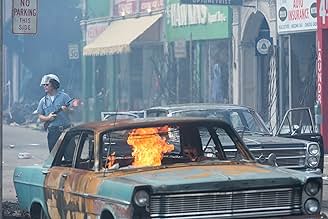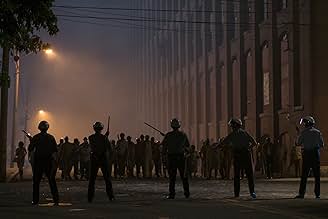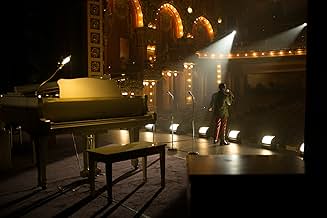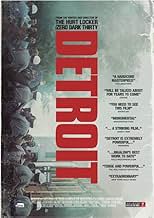Inmitten des Chaos der Detroit-Rebellion, als eine Ausgangssperre in der Stadt herrschte und die Nationalgarde von Michigan auf den Straßen patrouillierte, kam es zur tragischen Ermordung dr... Alles lesenInmitten des Chaos der Detroit-Rebellion, als eine Ausgangssperre in der Stadt herrschte und die Nationalgarde von Michigan auf den Straßen patrouillierte, kam es zur tragischen Ermordung dreier junger Afroamerikaner beim Algiers Motel.Inmitten des Chaos der Detroit-Rebellion, als eine Ausgangssperre in der Stadt herrschte und die Nationalgarde von Michigan auf den Straßen patrouillierte, kam es zur tragischen Ermordung dreier junger Afroamerikaner beim Algiers Motel.
- Auszeichnungen
- 5 Gewinne & 21 Nominierungen insgesamt
Joshua Olumide
- Dave
- (as Tokunbo Joshua Olumide)
Empfohlene Bewertungen
This film tells the story of a night going desperately wrong in Detroit.
I knew the film would be disturbing, so I have put off watching it. And it is really disturbing. I feel so so sorry for the residents of the hotel. No one deserves to be treated like this. This film shows me just how it is to be an ethnic minority in Detroit at the time. The injustice is just shocking. I sympathise with the victims, and really wish that justice could prevail.
I knew the film would be disturbing, so I have put off watching it. And it is really disturbing. I feel so so sorry for the residents of the hotel. No one deserves to be treated like this. This film shows me just how it is to be an ethnic minority in Detroit at the time. The injustice is just shocking. I sympathise with the victims, and really wish that justice could prevail.
As the first film to be distributed and released by Annapurna, Detroit tells the story about what happened during the 1967 riots, specifically the one in Detroit that put the city on the map and drove the population down from its highs back when Detroit was the Motor City. The acting, direction, music, and pace of this movie is well done and should've gotten Oscar love.
This is my first review. Not because I feel the movie was exceptionally good or bad, but because I feel like critics and reviewers appear to miss the main objective of this story.
Complaints about a lack of context are all over the place. The officers' motives & the real reason for the riots in general; those 2 aspects seem to iritate people greatly. Although I have to agree that these could have been worked out better, I don't feel like this was the movie's purpose. The story doesn't want to go too deep into the whole civil war that was going on in those times. It doesn't need to tell the story of how corrupt & unjust the force of law was back then. There are more recorded cases, movies, series & songs then we care to admit that factualize these terrible times. It simply serves as a base for a much more personal, much deeper story concerning that specific night and that specific place.
This movie is not about Detroit, or the riots. It's about what happened to those people in that motel in those couple hours. It's an emotional rollercoaster and a look in the minds of the victims as they went through hell and back. And once you realise this you'll find this is an excellent motion picture, with good acting, solid writing and directing and the capability of leaving you feeling empty, powerless and even ashamed.
That, to me, is a great movie. 8/10
Complaints about a lack of context are all over the place. The officers' motives & the real reason for the riots in general; those 2 aspects seem to iritate people greatly. Although I have to agree that these could have been worked out better, I don't feel like this was the movie's purpose. The story doesn't want to go too deep into the whole civil war that was going on in those times. It doesn't need to tell the story of how corrupt & unjust the force of law was back then. There are more recorded cases, movies, series & songs then we care to admit that factualize these terrible times. It simply serves as a base for a much more personal, much deeper story concerning that specific night and that specific place.
This movie is not about Detroit, or the riots. It's about what happened to those people in that motel in those couple hours. It's an emotional rollercoaster and a look in the minds of the victims as they went through hell and back. And once you realise this you'll find this is an excellent motion picture, with good acting, solid writing and directing and the capability of leaving you feeling empty, powerless and even ashamed.
That, to me, is a great movie. 8/10
The poster of Annapurna's newest film, Detroit hangs at my local theater like a provocation. A thin blue line of police officers struggles to hold back angry black protesters as big bold letters are scrawled along the side. The tagline reads: "It's time we knew." Those words, along with the required "from the creators of..." accolades are the only things on the poster that aren't sideways.
They might as well be though, considering the 1967 Detroit riot is about the only thing about Detroit most Americans know. And I'm sad to report that while the film does a good job of filling the screen with a few powerful moments, it never provides much insight into the "untold" story of the Motor City or how its story fits into the larger context of modern racial relations.
After an awkward Jacob Lawrence inspired history of the Great Migration, the film captures the precipitating actions of police that turned the city's long sitting racial resentments into a lit tinderbox. In a hybrid of dramatization and archival footage, Detroit then glosses over the actions taken by the state to subdue tensions before setting its sights on a host of singular stories. It becomes high noon at the Algiers Motel where unarmed black teens face off against white police and National Guardsmen. Then comes the trial.
All of these events could have been their own movies and delved into deeper depths as to the cause, devastation, aftermath and public perception of what was later dubbed the black days of July. Yet because Mark Boal's screenplay is so laser-focused on documented events and momentary minutia, everything is squished into an off-kilter collage of well-meaning but superficial docudrama. One whose central story, the Algiers Motel incident, is treated more like a genre horror film than either a granular traumatic event or police brutality in microcosm.
Detroit basically pulls a Dunkirk (2017), building unbelievable tension while giving us the bear minimum in character. It's all about the situation and the situation only. The recreation of which is beyond reproach. However, Detroit's grand design creates a narrative dissonance. One in which the individual experiences of real people just don't translate all that well.
The problem is compounded further by Barry Ackroyd's unvarnished cinematography which cuts between extreme closeups of wounded faces, voyeuristic overheads and wide shots of crowds angrily gathering in the streets. The lack of establishing shots, aerials, use of recognizable landmarks etc. hammers home the idea that something like this can happen anywhere. But the question, why can it happen anywhere, remains illusive up until we here the words "police criminality should be treated the same as criminality." By then it's too little too late.
Luckily director Kathryn Bigelow is very adept at inserting humanity within the margins saving Detroit from being just another Patriot's Day (2016). She finds a particularly redemptive subject in Algee Smith as up-and-coming Motown singer Larry Reed. The young actor displays an emotional intelligence well beyond his years, formulating a character that starts out with youthful swagger, ends with a shaken core, putting you in his head-space at all points in-between. Additionally, while most of the films attempts to color opposing forces with shades of grey fall flat, Reed's arc feels tragic but sadly understandable given the circumstance.
Unfortunately for both Bigelow and the city of Detroit, Detroit's script casts too wide a net to be especially impacting. It's procedural approach stifles the emotional stakes and its over-arching theme is turned in with much less humanity and passion than is deserved. Even with a towering performance by Algee, and the inclusion of Will Poulter who plays menacing/in-over-his-head real well, Detroit just can't transcends its trappings. To add insult to injury, the film itself was shot primarily in Boston...so there's that...
They might as well be though, considering the 1967 Detroit riot is about the only thing about Detroit most Americans know. And I'm sad to report that while the film does a good job of filling the screen with a few powerful moments, it never provides much insight into the "untold" story of the Motor City or how its story fits into the larger context of modern racial relations.
After an awkward Jacob Lawrence inspired history of the Great Migration, the film captures the precipitating actions of police that turned the city's long sitting racial resentments into a lit tinderbox. In a hybrid of dramatization and archival footage, Detroit then glosses over the actions taken by the state to subdue tensions before setting its sights on a host of singular stories. It becomes high noon at the Algiers Motel where unarmed black teens face off against white police and National Guardsmen. Then comes the trial.
All of these events could have been their own movies and delved into deeper depths as to the cause, devastation, aftermath and public perception of what was later dubbed the black days of July. Yet because Mark Boal's screenplay is so laser-focused on documented events and momentary minutia, everything is squished into an off-kilter collage of well-meaning but superficial docudrama. One whose central story, the Algiers Motel incident, is treated more like a genre horror film than either a granular traumatic event or police brutality in microcosm.
Detroit basically pulls a Dunkirk (2017), building unbelievable tension while giving us the bear minimum in character. It's all about the situation and the situation only. The recreation of which is beyond reproach. However, Detroit's grand design creates a narrative dissonance. One in which the individual experiences of real people just don't translate all that well.
The problem is compounded further by Barry Ackroyd's unvarnished cinematography which cuts between extreme closeups of wounded faces, voyeuristic overheads and wide shots of crowds angrily gathering in the streets. The lack of establishing shots, aerials, use of recognizable landmarks etc. hammers home the idea that something like this can happen anywhere. But the question, why can it happen anywhere, remains illusive up until we here the words "police criminality should be treated the same as criminality." By then it's too little too late.
Luckily director Kathryn Bigelow is very adept at inserting humanity within the margins saving Detroit from being just another Patriot's Day (2016). She finds a particularly redemptive subject in Algee Smith as up-and-coming Motown singer Larry Reed. The young actor displays an emotional intelligence well beyond his years, formulating a character that starts out with youthful swagger, ends with a shaken core, putting you in his head-space at all points in-between. Additionally, while most of the films attempts to color opposing forces with shades of grey fall flat, Reed's arc feels tragic but sadly understandable given the circumstance.
Unfortunately for both Bigelow and the city of Detroit, Detroit's script casts too wide a net to be especially impacting. It's procedural approach stifles the emotional stakes and its over-arching theme is turned in with much less humanity and passion than is deserved. Even with a towering performance by Algee, and the inclusion of Will Poulter who plays menacing/in-over-his-head real well, Detroit just can't transcends its trappings. To add insult to injury, the film itself was shot primarily in Boston...so there's that...
'DETROIT': Four and a Half Stars (Out of Five)
The new crime drama based on the racially charged Algiers Motel incident, during the 1967 12th Street riot in Detroit (the film was released to commemorate the 50th anniversary of the horrific incident). The movie was directed by Kathryn Bigelow, and it was written by acclaimed journalist/screenwriter Mark Boal (the duo also performed the same duties on both 2008's Best Picture winner 'THE HURT LOCKER', and 2012's Best Picture nominee 'ZERO DARK THIRTY'). The film stars John Boyega, Will Poulter, Algee Smith, Jason Mitchell, Jacob Latimore, Hannah Murray, Kaitlyn Dever, Jack Reynor, Ben O'Toole, John Krasinski and Anthony Mackie (who also costarred in 'THE HURT LOCKER'). It's received almost unanimous positive reviews from critics, and it's also a modest hit at the Box Office as well. I found it to be extremely well made and involving.
The film begins with a police raid of a private party, in 1967 Detroit, which then resulted in multiple days of rioting. The story then centers on a police raid of the Algiers Motel, on July 25th, where police believed a sniper fired on them from. The raid resulted in the terrorizing of several black suspects, and two white women, and the deaths of some of those involved. The story then shifts to the court room battle that followed the incident.
The movie is interesting, and pretty intense, from pretty much the opening scene until the last. All of the performances are good in it as well, and of course Bigelow's direction is almost flawless. For me the film was also very educational, as I knew very little about these events in history (prior to seeing the movie). I think the film is yet another great example of what a talented filmmaker Bigelow is, and obviously her and Boal make a great team together too. It's also cool to see Boyega in another strong starring role; a 'STAR WARS' actor that's actually making a name for himself (outside of the franchise) is always good to see.
Watch our movie review show 'MOVIE TALK' at: https://youtu.be/W6So6Kz52VQ
The new crime drama based on the racially charged Algiers Motel incident, during the 1967 12th Street riot in Detroit (the film was released to commemorate the 50th anniversary of the horrific incident). The movie was directed by Kathryn Bigelow, and it was written by acclaimed journalist/screenwriter Mark Boal (the duo also performed the same duties on both 2008's Best Picture winner 'THE HURT LOCKER', and 2012's Best Picture nominee 'ZERO DARK THIRTY'). The film stars John Boyega, Will Poulter, Algee Smith, Jason Mitchell, Jacob Latimore, Hannah Murray, Kaitlyn Dever, Jack Reynor, Ben O'Toole, John Krasinski and Anthony Mackie (who also costarred in 'THE HURT LOCKER'). It's received almost unanimous positive reviews from critics, and it's also a modest hit at the Box Office as well. I found it to be extremely well made and involving.
The film begins with a police raid of a private party, in 1967 Detroit, which then resulted in multiple days of rioting. The story then centers on a police raid of the Algiers Motel, on July 25th, where police believed a sniper fired on them from. The raid resulted in the terrorizing of several black suspects, and two white women, and the deaths of some of those involved. The story then shifts to the court room battle that followed the incident.
The movie is interesting, and pretty intense, from pretty much the opening scene until the last. All of the performances are good in it as well, and of course Bigelow's direction is almost flawless. For me the film was also very educational, as I knew very little about these events in history (prior to seeing the movie). I think the film is yet another great example of what a talented filmmaker Bigelow is, and obviously her and Boal make a great team together too. It's also cool to see Boyega in another strong starring role; a 'STAR WARS' actor that's actually making a name for himself (outside of the franchise) is always good to see.
Watch our movie review show 'MOVIE TALK' at: https://youtu.be/W6So6Kz52VQ
Wusstest du schon
- WissenswertesUsing a style she first adopted with Tödliches Kommando - The Hurt Locker (2008), director Kathryn Bigelow deployed three or four cameras at a time, keeping them in constant motion around the actors. Bigelow preferred to light the entire set to give the performers more flexibility to move around. She didn't block a scene for the camera by plotting out a series of close-ups and wide shots, instead filming everything in a few takes to keep the emotions as raw as possible. "After two or three takes, I have it," she said.
- PatzerThe telephones in the hotel rooms and elsewhere have handsets with modular connectors and flexible cords. Phones like that weren't available nationwide until the 1970s, but they were available in Detroit in 1961.
- Crazy CreditsBefore end credits: "The facts around the murders at the Algiers Motel on July 25th, 1967 were never conclusively established in a criminal proceeding. As a result, portions of this film were constructed and dramatized based on the recollections of the participants and available documents."
- Soundtracks(I Know) I'm Losing You
Written by Cornelius Grant, Eddie Holland (as Edward Holland Jr.) and Norman Whitfield
Performed by The Temptations
Courtesy of Motown Records
Under license from Universal Music Enteprises
Top-Auswahl
Melde dich zum Bewerten an und greife auf die Watchlist für personalisierte Empfehlungen zu.
- How long is Detroit?Powered by Alexa
Details
- Erscheinungsdatum
- Herkunftsland
- Offizielle Standorte
- Sprache
- Auch bekannt als
- Detroit: Zona de conflicto
- Drehorte
- Detroit, Michigan, USA(Detroit Police Station 10th Precinct)
- Produktionsfirmen
- Weitere beteiligte Unternehmen bei IMDbPro anzeigen
Box Office
- Budget
- 34.000.000 $ (geschätzt)
- Bruttoertrag in den USA und Kanada
- 16.790.139 $
- Eröffnungswochenende in den USA und in Kanada
- 350.190 $
- 30. Juli 2017
- Weltweiter Bruttoertrag
- 23.355.100 $
- Laufzeit2 Stunden 23 Minuten
- Farbe
- Sound-Mix
- Seitenverhältnis
- 1.85 : 1
Zu dieser Seite beitragen
Bearbeitung vorschlagen oder fehlenden Inhalt hinzufügen









































